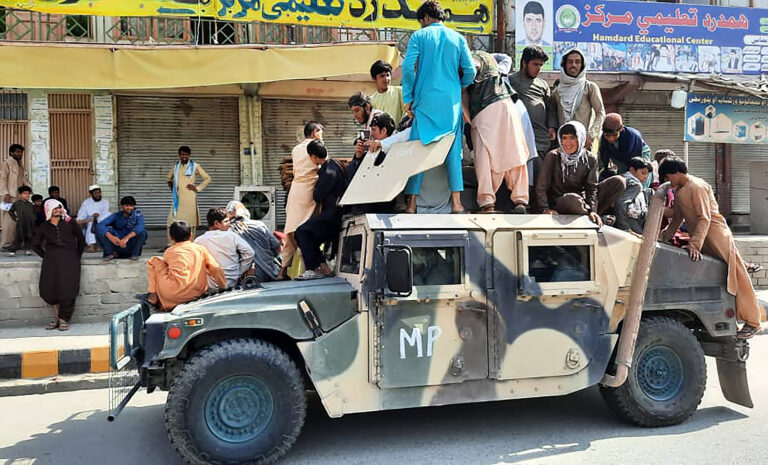
The International League of People’s Struggle (ILPS) is watching closely the developments in Afghanistan in recent days: the capture of the country’s capital Kabul by the Taliban rebel forces and the collapse of the US-installed and US-backed Ashraf Ghani regime. These occurred despite US assurances of the regime’s stability, days before the complete pullout of US troops from the country, and after 20 years of colonization that was enforced after a brutal and bloody war of aggression that resulted in protracted crisis not only in Afghanistan but also in Pakistan. The Pakistan state and the army was also provided millions of USD to further the so-called War on Terror.
The fall of Kabul is a significant defeat for US imperialism. It is a spectacular demonstration that the world’s foremost superpower failed to bring genuine peace, development and democracy to Afghanistan — despite waging its longest war of aggression against any country. It highlights how the Taliban, through two long decades, was able to preserve itself, wear out a militarily more powerful enemy, and avail of conditions that forced the US to pull out its military forces.
The US defeat in Afghanistan brings to mind its historical defeats in Vietnam and Iraq, and shows how an imperialist power waging war against a sovereign country and occupying it will only breed resistance among the people, who are capable of winning. It also reminds the people of the world how, in 1978 during the Cold War, the Soviet Union invaded Afghanistan to make it Soviet imperialism’s Vietnam, a costly quagmire of a war, that eventually led to the defeat of the Soviet aggressors and withdrawal of its troops in 1988-89. This was also the breeding ground for various fundamentalist terrorist networks in the region and beyond that have continued to destabilize the region.
The US war on, and occupation of, Afghanistan are most unjust. The death of Donald Rumsfeld recently reminded the people of the world that this war criminal and key power-holder in the US government was already gung-ho on waging war just hours after the 9-11 attacks. The US did not have a solid basis for attacking Afghanistan — even as it used deceptive rhetoric of women’s rights, human rights, freedom, democracy and “war on terrorism” to prosecute the war.
US imperialism waged the war for its own interests: to re-assert its military might after the 9-11 attacks, to control Afghanistan’s natural resources, and to strengthen its military presence in Central and South Asia in advancing its geopolitical interests there. Successive US regimes used the war to whip up reactionary nationalism among the American people and win elections. The war boosted the immense super profits of the monopoly-capitalists in the US military-industrial complex.
The US war on Afghanistan is most costly for the people of Afghanistan, the US and the world. Killed in the war were 47,245 Afghan civilians, 66,000 Afghan national military and police, 51,191 members of Taliban and other opposition groups, 2,448 US service members, 3,846 US contractors, 1,144 service members from allied countries, 444 aid workers, and 72 journalists. The US spent so much on the war and a significant section of basic Afghani infrastructure was destroyed.
Based on its record, it is unlikely that the Taliban will rule in a way that will uphold the Afghani people’s interest for genuine freedom, democracy, respect for human rights and pro-people development. Global powers China and Russia have immediately expressed their willingness to work with the Taliban government. At the same time, the situation can also provide the US imperialist forces and allies, especially NATO to build legitimacy for another occupation in Afghanistan and maybe beyond. It seems that from being a direct colony of the world’s top superpower, Afghanistan will now be subject to competition for influence by other global powers.
The hope of the people of the world lies in the Afghani people, and their unity, movement and struggle. The ILPS looks forward to the emergence and advance in Afghanistan of an anti-imperialist and democratic movement of the people. We hope that this movement will have a pro-people assessment of Afghani history, especially the US war of aggression and occupation, and lead the struggle of the Afghani people for genuine national independence, democracy and socialism. ###